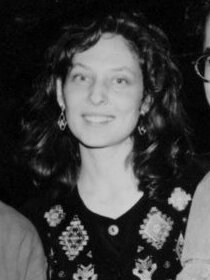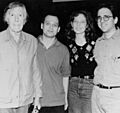Julia Wolfe facts for kids
Quick facts for kids
Julia Wolfe
|
|
|---|---|

Wolfe in 1982
|
|
| Born | December 18, 1958 Philadelphia, Pennsylvania, U.S.
|
| Nationality | American |
| Alma mater | |
| Occupation | Composer, Professor of Music |
| Spouse(s) |
Michael Gordon
(m. 1984) |
| Children | 2 |
Julia Wolfe, born on December 18, 1958, is a talented American composer. She also teaches music at New York University. People say her music is special because it mixes classical styles with the strong, repeating rhythms of rock music.
In 2015, Julia Wolfe won the famous Pulitzer Prize for Music for her work called Anthracite Fields. This piece is like a big musical story for a choir and instruments. She also received the Herb Alpert Award in 2015. In 2016, she became a MacArthur Fellow, which is a special award for very creative people.
Contents
Julia Wolfe's Early Life and Education
Julia Wolfe was born in Philadelphia. She has a twin brother and an older brother. When she was a teenager, she learned to play the piano. But she only started studying music seriously later on.
She took a music class at the University of Michigan. There, she earned a degree in music and theater in 1982. In her early twenties, Julia wrote music for a theater group made up of only women.
How Julia Wolfe Started Her Music Career
During a trip to New York, Julia Wolfe met two other music students. Their names were Michael Gordon and David Lang. They had both studied at the Yale School of Music. They encouraged Julia to apply there too.
She went to Yale in 1984 and studied with Martin Bresnick. She also married Michael Gordon that same year. After getting her master's degree in 1986, Julia, Michael, and David started something amazing.
Founding Bang on a Can
In 1987, Julia Wolfe, Michael Gordon, and David Lang created a new music group called Bang on a Can. This group has grown a lot since then. It now has concert series, tours, and a summer festival. The festival helps new composers and performers.
In 1993, the three friends also started a company called Red Poppy Music. This company publishes printed music. Later, in 2001, they founded a record label called Cantaloupe Music.
Julia Wolfe received a special scholarship called a Fulbright Scholarship in 1992. This allowed her to travel to Amsterdam. In 2012, she earned her PhD in music composition from Princeton University.
Since 2009, Julia Wolfe has been a music professor at New York University. Before that, she taught at the Manhattan School of Music for seven years. In 2018, she received an honorary degree from Drew University. Julia Wolfe and Michael Gordon are still married and have two children. They live in New York City.
Julia Wolfe's Unique Musical Style
Julia Wolfe has written many pieces for string instruments. These include music for small groups and for full orchestras. The New Yorker magazine said her string quartets are exciting. They combine the strong energy of rock music with calm, repeating patterns. They use the four string instruments like a big guitar.
Exploring Different Themes in Music
Julia Wolfe's piece Cruel Sister is for a string orchestra. It was inspired by an old English song about two sisters who are rivals in love. Another piece, My Beautiful Scream, was written after the events of September 11, 2001. It was inspired by the idea of a slow-motion scream.
Her works like The Vermeer Room, Girlfriend, and Window of Vulnerability create clear musical pictures. Girlfriend uses sounds like skidding cars and breaking glass. The Vermeer Room was inspired by a painting by Johannes Vermeer that had a hidden figure.
Pop Culture and Labor History in Music
You can hear the influence of pop music in many of Julia Wolfe's works. Lick is based on parts of funk music. My Lips From Speaking for six pianos was inspired by the beginning of Aretha Franklin's song "Think." Her piece Dark Full Ride explores the drum set. Lad is a unique piece for nine bagpipes.
Julia Wolfe also uses history in her music. For her Pulitzer Prize-winning piece Anthracite Fields, she learned about the lives of coal miners. She used stories, interviews, and local rhymes from her home state of Pennsylvania. This piece is about the coal mining community.
Her interest in labor history also inspired Steel Hammer. This piece was about the legend of John Henry, a strong man who raced against a machine. It was a finalist for the Pulitzer Prize in 2010.
Music for Body Percussion and Important Events
Julia Wolfe also wrote riSE and fLY. This is a concerto for a body percussionist named Colin Currie. It means the musician makes music using only their body.
Her piece Fire in my mouth premiered in 2019. It was based on a lot of research about the terrible Triangle Shirtwaist Factory fire. Her most recent piece, unEarth, uses scientific information about climate change. It premiered in 2023.
Music for Film and Theater
Julia Wolfe has also created music for films. This includes Fuel for a film by Bill Morrison. She also made music for old 1920s experimental films.
She has worked with many artists, including theater artist Anna Deavere Smith and filmmaker Bill Morrison. Her music has been performed at famous places like the Brooklyn Academy of Music and Carnegie Hall.
Julia Wolfe won an Obie Award for her music for Ridge Theater's Jennie Richie. She has also worked with Michael Gordon and David Lang on multimedia projects. These include Lost Objects and Shelter. They also created The Carbon Copy Building with comic-book artist Ben Katchor.
In Bordeaux, France, Julia Wolfe created a city-wide event called Traveling Music. One hundred musicians walked and rode in special bikes, filling the streets with music.
Bang on a Can: A Music Collective
Julia Wolfe is one of the founders and leaders of Bang on a Can. This group is famous for its Marathon Concerts. During these concerts, many different types of music are played for many hours. People can come and go as they like.
For their twentieth anniversary, Bang on a Can held a twenty-six-hour concert. It was at the World Financial Center in New York City. In 1992, Bang on a Can also started a smaller music group called the Bang on a Can All-Stars.
Early Bang on a Can events included performances by John Cage. They also featured large symphonies for electric guitars by Glenn Branca.
Sometimes, Julia Wolfe, Michael Gordon, and David Lang work together on big musical projects. They often don't say who wrote which parts. Their opera The Carbon Copy Building won an Obie Award in 2000. It had a comic strip that went along with the singers.
Another project they worked on was Lost Objects. They also created Shelter, a multimedia work. This piece explored themes like the power of nature and the safety of a new home. Both Shelter and Carbon Copy Building were staged by Ridge Theater. In 2017, they wrote Cloud River Mountain with Chinese singer Gong Linna. They also premiered Road Trip in 2017, celebrating Bang on a Can's 30-year journey.
List of Works
Orchestra Music
- Pretty (2023) – for full orchestra
- Fountain of Youth (2019)
- Fuel (2007) – for string orchestra
- Cruel Sister (2004) – for string orchestra
- Tell me everything (1994)
- Window of Vulnerability (1991)
- The Vermeer Room (1989)
- Amber Waves of Grain (1988)
Music for Soloists and Orchestra
- unEarth (2023) — for chorus, female voice, and orchestra
- Her Story (2022) — for 10 female voices and orchestra
- Flower Power (2020) — for amplified ensemble and orchestra
- Fire in my mouth (2018) – multimedia oratorio for 146 female voices and orchestra
- riSE and fLY (2012) – for body percussion and orchestra
- Steel Hammer (2009) – for 3 singers, Appalachian and traditional instruments
- My Beautiful Scream (2003) – for amplified string quartet and orchestra
Music for Large Ensembles (7 or more players)
- Anthracite Fields (2014) – for chorus and mixed instruments
- You breathe (2013) – for chorus and string quartet
- Combat de Boxe (2011)
- Guard My Tongue (2009) – for chorus
- Traveling Music (2009) – for 100+ musicians of any type
- Thirst (2008) – for chorus and mixed ensemble
- Stronghold (2008) – for 8 Double Basses
- Lad (2007) – for Nine bagpipes
- Impatience (2005)
- Steam (1995)
- Arsenal of Democracy (1993)
- Girlfriend (1988) – for amplified mixed chamber ensemble and recorded sound
Music for Soloist(s) and Large Ensemble
- Accordion Concerto (True Love) (2005) – for Accordion and Orchestra
Music for 2–6 Players
- Retrieve (2016) – for cello and double bass
- Splendid hopes (2016) – for string quintet
- Blue Dress for string quartet (2015) – for string quartet
- Cha (2015) – for saxophone quartet
- Reeling (2012)
- With a blue dress on (2010, revised 2014) – for 5 violins/voice
- singing in the dead of night (2008)
- Big Beautiful Dark and Scary (2002) – for amplified sextet
- Dark Full Ride (2002) – for four drum sets
- Close Together (2000) – for cello, percussion, electronic tape
- Believing (1997) – for amplified sextet
- Mink Stole (1997) – for violin, piano
- Dig Deep (1995) – for string quartet
- Lick (1994) – for amplified sextet
- my lips from speaking (1993) – for 6 pianos
- Early That Summer (1993) – for string quartet
- Four Marys (1991) – for string quartet
- On Seven-Star-Shoes (1985)
Solo Music
- Spinning (2018) – for Cello
- Spinning Jenny (2016) – for Violin
- Emunah (2015) – for Cello
- Lass (2014) – for Flute
- Iron Maiden (2011) – for Percussion
- Compassion (2001) – for Piano
- Earring (2001) – for Piano
- East Broadway (1996) – for Toy piano, toy boombox
Collaborative Works
- Road Trip (2017) – Music by Michael Gordon, David Lang, and Julia Wolfe.
- Cloud-River-Mountain (2015) – Music by Michael Gordon, David Lang, Julia Wolfe, and Lao Luo.
- Water (2008) – Music and text by Michael Gordon, David Lang, and Julia Wolfe.
- Shelter (2005) – Music by Michael Gordon, David Lang, and Julia Wolfe. Text by Deborah Artman.
- Lost Objects (2001) – Music by Michael Gordon, David Lang, and Julia Wolfe. Text by Deborah Artman.
- The Carbon Copy Building (1999) – Music by Michael Gordon, David Lang, and Julia Wolfe. Text by Ben Katchor.
Arrangements
- Music for Airports (1998)
Film
- New York Composers: Searching for a New Music (1997). Directed by Michael Blackwood.
Selected Recordings
- Anthracite Fields by Julia Wolfe with the Choir of Trinity Choir Wall Street and the Bang on a Can All-Stars (2015)
- Steel Hammer by Julia Wolfe with Trio Mediæval and the Bang on a Can All-Stars (2014)
- Cruel Sister by Julia Wolfe with Ensemble Resonanz (2011)
- Dark Full Ride by Julia Wolfe (2009)
- Julia Wolfe: The String Quartets (2003)
- Arsenal of Democracy by Julia Wolfe (2003)
- Lost Objects with artists Michael Gordon, David Lang, Deborah Artman, and Concerto Köln (2001)
Images for kids
-
Wolfe with composers John Cage, David Lang, and Michael Gordon in 1982
See also
 In Spanish: Julia Wolfe para niños
In Spanish: Julia Wolfe para niños
 | Emma Amos |
 | Edward Mitchell Bannister |
 | Larry D. Alexander |
 | Ernie Barnes |


